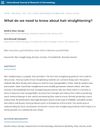2 citations,
February 2021 in “Case reports in dermatological medicine” The new topical botanical formulation significantly regrew hair in all five patients without side effects.
 1 citations,
January 2023
1 citations,
January 2023 Functional foods can improve hair and skin health.
 1 citations,
January 2013 in “Journal of Cosmetics, Dermatological Sciences and Applications”
1 citations,
January 2013 in “Journal of Cosmetics, Dermatological Sciences and Applications” The document concludes that a new treatment for a type of hair loss called telogen effluvium was tested and shows promise.
 October 2024 in “Archives of Dermatological Research”
October 2024 in “Archives of Dermatological Research” Male and female pattern hair loss have different molecular pathways, suggesting unique treatment targets for each sex.
 October 2024 in “International Journal of Molecular Sciences”
October 2024 in “International Journal of Molecular Sciences” Rosa rugosa extract promotes hair growth and could be a natural treatment for hair loss.
 September 2024 in “Archiv Euromedica”
September 2024 in “Archiv Euromedica” Trichoscopy is a quick, accurate, and non-invasive method to diagnose and treat non-scarring hair loss.
 May 2024 in “Journal of medicinal food”
May 2024 in “Journal of medicinal food” Jojoba oil has many uses beyond skincare, including health benefits and pharmaceutical applications.
Aesthetic rehabilitation techniques can improve life quality and wellbeing for disabled patients.
 November 2023 in “The journal of investigative dermatology/Journal of investigative dermatology”
November 2023 in “The journal of investigative dermatology/Journal of investigative dermatology” Skin cells and certain hair follicle areas produce hemoglobin, which may help protect against oxidative stress like UV damage.
 August 2023 in “Dermatology and Therapy”
August 2023 in “Dermatology and Therapy” Experts recommend personalized treatment plans for best outcomes in managing Alopecia Areata.
 July 2023 in “IntechOpen eBooks”
July 2023 in “IntechOpen eBooks” New treatments for alopecia areata show promise, but more research is needed to confirm their effectiveness.

Most postmenopausal women experience significant skin changes and various skin conditions.
 July 2023 in “International Journal of Cosmetic Science”
July 2023 in “International Journal of Cosmetic Science” Biopolymers are increasingly used in cosmetics for their non-toxicity and skin benefits, with future biotech advancements likely to expand their applications.
 June 2023 in “Stem cell reviews and reports”
June 2023 in “Stem cell reviews and reports” Stem cell therapies could be a promising alternative for hair loss treatment, but more research is needed to understand their full potential and safety.
 May 2023 in “Health science reports”
May 2023 in “Health science reports” Coloring shampoos for gray hair may cause gene mutation, reproductive issues, and skin damage, needing stricter regulation and expert consultation.
 January 2023 in “Journal of surgery and research”
January 2023 in “Journal of surgery and research” New treatment effectively reverses hair thinning in most patients with mild side effects.
 December 2022 in “Journal of Education, Health and Sport”
December 2022 in “Journal of Education, Health and Sport” COVID-19 can cause hair loss, often treated effectively with a combination of supplements and topical treatments.
 October 2021 in “Cosmoderma”
October 2021 in “Cosmoderma” Hair loss can be managed with treatments like minoxidil, finasteride, and others, but there are still gaps in effectiveness and off-label usage is increasing.
 August 2021 in “International Journal of Research in Dermatology”
August 2021 in “International Journal of Research in Dermatology” Modern hair straightening improves manageability and strength while maintaining natural waves.
 January 2019 in “Journal of Dermatology and Venereology”
January 2019 in “Journal of Dermatology and Venereology” Sesame and pumpkin seed oil can effectively regrow hair in alopecia areata.
 April 2017 in “Journal of dermatology & cosmetology”
April 2017 in “Journal of dermatology & cosmetology” The marine protein complex, Viviscal®, was found to effectively reduce hair loss and improve hair, skin, and nails quality in women.
March 2023 in “Anais Brasileiros De Dermatologia” Topical minoxidil is the best-supported treatment for female hair loss, but personalized plans are needed.
 January 2022 in “Turk Dermatoloji Dergisi”
January 2022 in “Turk Dermatoloji Dergisi” Topical procyanidin B2 significantly increases hair count and is a safe treatment for male pattern baldness.
 May 2023 in “Journal of medical case reports”
May 2023 in “Journal of medical case reports” A young girl with skin and scalp conditions showed some improvement with treatment.
 January 2024 in “American journal of clinical dermatology”
January 2024 in “American journal of clinical dermatology” Ritlecitinib is safe and well-tolerated for treating alopecia areata in patients aged 12 and older.
 January 2023 in “Acta dermatovenerologica Alpina, Pannonica et Adriatica (Tiskana izd.)”
January 2023 in “Acta dermatovenerologica Alpina, Pannonica et Adriatica (Tiskana izd.)” The article concludes that schoolchildren and adolescents experienced various skin issues during the COVID-19 pandemic, including acne from masks and other skin reactions from the virus and vaccines.
 77 citations,
March 2001 in “Clinics in Dermatology”
77 citations,
March 2001 in “Clinics in Dermatology” Androgenetic alopecia involves genetics, hormones, and can be treated with medications or surgery.
 2 citations,
January 2019 in “International Journal of Medicine in Developing Countries”
2 citations,
January 2019 in “International Journal of Medicine in Developing Countries” Telogen Effluvium is a common hair loss condition, particularly in women, with no specific FDA-approved treatment, and recovery can take up to 18 months.
16 citations,
January 2022 in “International journal of molecular sciences” Certain daily habits like stress, diet, and sleep can affect the severity of hair loss in alopecia areata.
 January 2021 in “Erciyes medical journal”
January 2021 in “Erciyes medical journal” The COVID-19 pandemic changed the types of skin conditions seen at a clinic, with fewer patients and varying numbers of specific conditions.

























